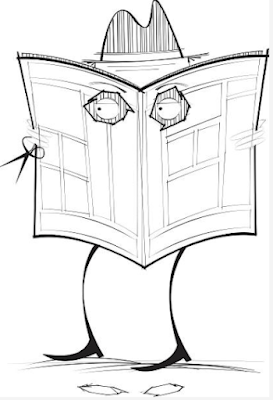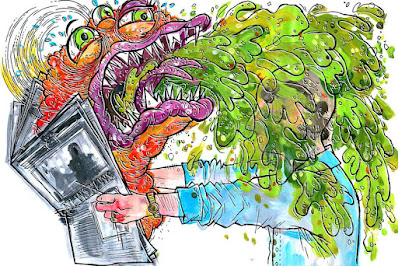How Raw Ambition Grossly Outstripped Ability
and Brought Down a Half-Decent Newspaper
The plot: Buck Smith has died. After standing in as editor for a couple of weeks, while Johnno Duncannon was doing some volunteer work in the Outback, Buck rewarded himself and his wife Mimi Riefenstahl with a junket in Bali. After a fortnight of sex, drugs and rock ’n’ roll, Buck got on the plane to come home, closed his eyes for the first time in 14 days, fell asleep and never woke up. His successor, Roscoe Quaid, decided to hold a wake, and the following characters turned up:
. Johnno Duncannon, an editor
(of sorts)
. Fatso Elliott, a would-be
if could-be ‘journalist’
. Paddy Meggs, burning red
hair, burning ambition
. Robert ‘Falcon’ Hungerbrook,
a vacant lot (of ambition)
. Isaac Appleseed, a
backstabber and a bedpusher
. Mick Wencenlaus, an
‘editor’ who couldn’t edit
. Ivan Booker, a flake out of
a snowdrift
. Travis ‘Mumbojumbo’ Fickle,
a pretend journalist.
. Mal Tinker, an ‘editor’ who
couldn’t lie straight in bed.
. Wim Highland, an ‘editor’ in name only.
These are their stories:
Johnno Duncannon has a hide as thick as a rhinoceros, and usually smells as bad. He survived as an editor as long as he did by refusing, as often as was humanly possible, to make decisions. Those decisions he did make were usually disastrous, as was often the case with what he mistook for off-the-cuff humour. For all that, Johnno is generally considered a likeable chap, a man of many talents and reasonably pleasant company. He’s a more robust and less alcohol-fuelled version of the late dribbler Owen Thomson, The Australian editor who was the prototype of Sir Les Patterson. Unlike Thommo, however, Johnno might have traces of last night’s dinner on his shirt and tie, but seldom vomit. Johnno’s legacy is nonetheless tainted. An illicit affair with a volatile features editor was ill-advised, and quite costly. And ultimately, his “anointing” of various young staff members as future editors showed a very serious lack of judgement – both of character and of real journalistic ability. To this day Johnno just “hangs in there”, though he’s considered with decreasing reverence with each passing hour.
Fatso Elliott somehow got himself a job on the weekly throwaway. He couldn’t write, couldn’t spell, couldn’t condense a flower show report to under 850 words and never met a deadline (even on a weekly). But he let it be known he “knew people”. This came to be interpreted as meaning he had important contacts within the government. What it actually meant was that he “knew people” – his mother, who had once dated a dentist and a sports hero, his all-forgiving unsighted father, and an even uglier brother who served in the navy and had extremely unsavoury sexual habits (of which he boasted to Fatso, who passed the grotesque details on to horrified colleagues). Fatso was so convincing about his “knowing people” that heads of departments actually went toe-to-toe arguing over which section he should join once Johnno Duncannon had agreed (albeit with some justifiable reticence) to move Fatso upstairs to the daily. Little did they know what they were arguing over – a complete waste of space. But Fatso still managed to maintain the pretence that he “knew people”. Once, after a budget lock-up in Parliament House, Fatso had his taxi make a detour so he could drop off hitherto embargoed budget papers at a “secret location”. This in fact was the home of an ambitious young would-be politician, who had pretences all of her own. She and Fatso had a nodding relationship – she was living with a would-be political journalist who had great ambitions himself, and not much more ability than Fatso. Between the three of them they had cooked up a widespread false impression that they were “in the know”, and could interpret budget papers into a language they hadn’t quite mastered themselves – the word “scoop” was bandied about, rather loosely. What happened to Fatso? He finished up calling in some perceived favours and getting himself a cushy number in a government department. Ironically, it involves dealing with the media, of which he still knows next to nothing.
Paddy Meggs was the star performer at a provincial university’s
school of journalism, which means he had no preparation for real newspaper work
at all. Nonetheless, he felt he was in a position to make certain demands
regarding his appointment to a metropolitan daily, giving prospective employers
the mistaken idea he was playing one off against the other. For all that, he
duly arrived back in his home town with at least the ability to spell correctly
and string together a few intelligible words. From that point on, his rise in
the establishment was relatively fast, steady and assured (well, self-assured
anyway). In time Paddy, from his own perspective, became master of all he
surveyed. He had kept his nose clean, his blade outwardly unbloodied and his
shirts washed and neatly ironed. His tongue was a different matter. It was
forked, and capable of both virtuous false offerings and deep-seated vitriol. And
it served him well. Today he sits atop the dung heap, proving patience can
indeed be a virtue. Whether he has truly earned this elevated position is
another matter entirely.
Robert ‘Falcon’ Hungerbrook is as different from Paddy as crap is from clay. Which is which? I’ll let you be the judge. Suffice to say that, unlike Paddy, Falcon has virtually no journalistic ability at all. Along with that deficiency, he’s lacking three vital parts of his anatomy – a heart and two testicles. Yet Falcon too has returned to old haunts and in the goodness of time risen to heights way beyond his skills level. And he has an even more warped idea of what is right and wrong. Falcon will mindlessly attack critics of his newspaper’s decisions, in one case arguing that the critic – in this particular instance the spokesperson for an organisation which had been maligned - should have sounded out Falcon before putting pen to paper. It’s an odd attitude: the newspaper might well have sounded out the spokesperson first, before going into print with falsehoods. But there you have it, that’s Falcon’s thinking. Where Falcon will end up goodness only knows, but one suspects the sooner forgotten the better.
Isaac Appleseed, unlike Paddy and Falcon, came in through the back door. But he had had some experience. Once the general dogsbody of a provincial bi-weekly, he was a somewhat minor power player within the newspaper group which had somehow managed to get hold of a once-respected metropolitan daily. This major setback for the daily enabled Isaac to inveigle his way to the Big Smoke. And once there, he soon began quietly and effectively planning and plotting his way to the top of the organisation. It could be said he did this with deadly military precision, which is closer to the truth than Isaac ever let on. Indeed, he’d had prior knowledge of how to push obstacles to his progress off the cliff edge.
Isaac’s other advantage was that he always knew his own limitations. He was constantly missing in action as deadlines approached, and thus avoided those pressure points which sometimes expose a journalist’s breaking point. For most part, Isaac cleverly stayed in the background, silently stabbing the backs of those immediately in front of him and making certain no blood stains were left behind. In time Isaac reached the coveted position of editor, and managed to hold on during four years of the daily’s rapid downward spiral. But in the end the owners pulled the chair from under him. There was no big thud, considering he was a big man. He just went quietly, into the dimness of newspaper obscurity, from whence he’d come.
Mick Wencenlaus came from a background in ambulance chasing in the
nation’s backblocks to be first editor of the Sunday and then editor of the daily.
It took what seemed to be an inordinately long time to get rid of him again,
but he was eventually elevated to back-stabbing, staff-cutting operations
within the overall group. Afterwards he worried endlessly about his legacy.
Sadly for him, it was as a laughing stock. He’d once advertised for a new staff
member to cover a major international event, which happened to be coming up in
Athens rather than Rome. But, hey, what’s the difference between one European
capital and another? A few kilometres? The thing was, Mick had been put in
charge of a metropolitan daily, one which needed to have a world view, and Mick
was unworldly in the absolute extreme, devoid of any awareness of what lay
beyond his immediate surrounds. Mick’s world was limited to the distance he
drove his sports car from a nearby block of units to the office, and extended
not one mile further. Strangely enough, Mick’s wife worked for an airline, and
he must have sometimes wondered why it took so much longer to fly to Madrid
than to Mildura. Such innocence was no blessing in an editor.
Ivan Booker was one of the two more hilarious appointments made by Mick Wencenlaus, the other being Travis ‘Mumbojumbo’ Fickle. Neither had ever previously worked in newspapers, daily or otherwise. Neither had any idea about deadlines, or when and how stories broke. Ivan had been a motoring magazine editor, full of bright ideas about how to play around with modern typesetting technology, none of them in the least bit practical. Ivan also thought his reporters would know by 8am what stories they would have at 5.30pm. He was another cruelly – but fairly - nicknamed by Wim Highland, in his case merely “Ivan the Idiot”. Ivan lasted but a few weeks, until shifted back to monthly magazine work. He was gone and very quickly forgotten. But he’d done sufficient damage to staff morale in the short time he was there that the daily never fully recovered.
Travis ‘Mumbojumbo’ Fickle was the pretender Mick Wencenlaus got when he
advertised for a man to go to Rome. Travis probably would have gone to Rome,
too, but someone kindly pointed out to him that the event he was covering was
actually being held in Athens. So he studied the Athens form avidly, quickly
informing Mick of all the unimportant events he intended to cover. Travis
really had no idea about newspapers, big, small or indifferent. He still
hasn’t. He has found his true niche as a taxi driver, though the name still
occasionally bobs up online, when Travis scribbles something incomprehensible about
things of which he knows nothing. He has written books too, which he gives away
(lovingly signed) to fans like Mick Wencenlaus, since none of them sold.
Mal Tinker was the “editor” the daily got when it got rid of Mick Wencenlaus. Mal did have a world view, of sorts. The trouble was that whereas Mick had at least chased ambulances, Mal had never honestly chased anything, but had simply sat in an overseas office playing with himself and formulating packs of lies about himself in order to get stories. He came to the daily with the well-earned reputation of a dangerous, compulsive liar. But, as a well practised liar himself, he had lost the capacity to discern lies told to him, and was immediately prey for fellow liars. His weakness for pretty faces and flashing eyelids was even greater than Johnno’s.
Having worked alone in South-East Asia for many years, Mal was incapable of managing a large staff. Together, these traits made his editorship fraught, and indeed dangerous. He was a complete contradiction, nit-picking minor typos yet making glaring, laughable mistakes himself. This was the man who famously changed a veteran journo’s words from “Kopper’s Log” (used for fencing) to “policeman’s log”. Happily, he didn’t last very long, but the damage was done. Under Mal and Mick, two of the owners’ worst possible appointments, the daily’s credibility collapsed, readership dropped through the floorboards and recovery became impossible. Mal wandered off home, to his long-suffering wife and a job looking after a club. He wrote a book, but it too was riddled with mistakes.
Wim Highland came in on the coattails of Isaac Appleseed. His ambitions outwardly matched those of Isaac, but his ability to walk with aplomb over the bodies of those who lay in front him was no match for Isaac’s. He didn’t last long, just long enough to be put in charge of the Sunday, briefly. He then disappeared, never to be sighted again (except, passingly, as a key witness in one of the country’s most intriguing unsolved murder cases). In fairness, it must be said that Wim, perhaps being of a like mind, had the capacity to see straight through the multitude of pretentious bullshitters and pretenders around him. It was he who nicknamed Travis Fickle “Mumbojumbo”. Not that it was a difficult choice of nickname, given Fickle’s writing inability.
















No comments:
Post a Comment